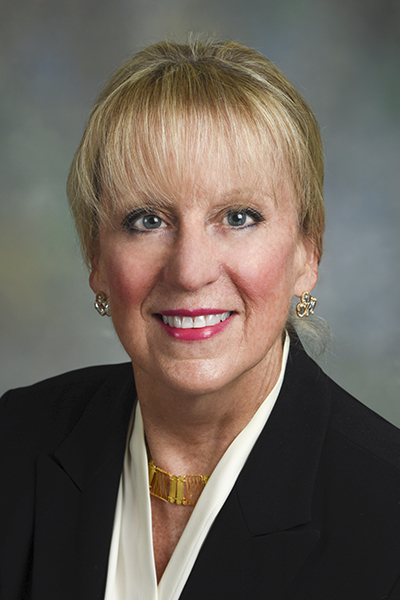“Healthcare is by its nature fast-paced and high risk. The changes we’re seeing in the industry today force us to innovate, reevaluate our practices, and look for ways to improve. Nimble thought and quick action are key competencies,” says Reba Phillips, director of compensation and benefits for BJC Healthcare in St. Louis.
Phillips has been with BJC, one of the largest nonprofit healthcare organizations in the United States, since 2014, but her expertise in HR predates that by fifteen years. Now she’s leading the charge to create well-rounded benefits offerings for the organization’s 32,000 employees, and she relishes the challenges and opportunities inherent in healthcare.

“Healthcare is interesting—it’s got that juxtaposition of business operations, patient care, and extraordinary compassion,” she says. “Our goal in HR is to take exceptional care of the people who take exceptional care of our patients and provide an unsurpassed employee experience. The total rewards we offer are grounded in BJC’s principles of compassion, respect, excellence, safety, and teamwork.”
With expanding needs, evolving regulations and insurance reimbursement models, and increasing benefits costs, HR is up against some serious challenges. Phillips and her team navigate these challenges by keeping the culture and BJC brand aligned across the entire organization, encouraging employees and leaders to think of themselves as part of the BJC family rather than as independent entities. They also work with vendors to control costs.
Listening is also essential to success, Phillips says. “Within HR, our customers are our team members as well as our patients, their families, and the communities we serve,” she explains. “As we navigate through industry changes, we at BJC choose to actively listen to the voices of our team members and give them an opportunity for open dialogue. We want their honest reactions, suggestions, and perspectives, which helps us tailor benefits offerings and increases engagement.”
Phillips and her team are two years into a major compensation initiative centered on foundational respect of the past while designing for the future. A key outcome of this work is to increase organizational transparency. “There are a lot of moving parts, and building multiple levels of training and communication will be key to a successful launch,” she says.
Phillips and her team have already taken steps to tailor messaging and benefits offerings to the five different generations currently in the workforce. “Our benefit programs need to be robust and address multigenerational preferences and needs. We need to connect with our team members where they are in their lifecycle and use empathy to understand their individual needs. Someone early in their career will have different financial planning and healthcare needs than someone approaching retirement,” she says. “We also need to think beyond a one-size-fits-all approach when considering communication styles and platforms. Older generations may want to feel the paper and turn pages as they read. Younger employees prefer one-click electronic access on a mobile device.”
“Healthcare is interesting—it’s got that juxtaposition of business operations, patient care, and extraordinary compassion.”
The BJC HR team has also embraced new technology in an effort to increase convenience for team members. Two years ago, they launched telemedicine options for noncritical care; one year ago, they expanded this benefit with no out-of-pocket costs—serendipitous timing considering the COVID-19 pandemic. “We already had a virtual care model in place at no out-of-pocket cost ahead of the pandemic. You can’t put a dollar value on that benefit for our team members,” Phillips says.
One of the biggest HR challenges in healthcare today, Phillips says, is the increasingly competitive environment for talent. “We have to balance the intensely competitive marketplace with internal equity and budget constraints,” she says. “This is further exacerbated for those of us in the nonprofit space—we are competing with for-profit organizations for the same talent, yet we have different revenue streams and governing regulations.”
To compete in this environment, Phillips and her team strive to differentiate the BJC brand. “What do we have to offer employees that goes above and beyond the paycheck? What intangibles can we leverage? For example, the fact that we are a major academic medical center is a significant draw for professionals who want the challenge of being in an extremely cutting-edge environment.”
Another major initiative Phillips and her team have recently tackled is designing and recruiting for specialty nurse roles—and the pay to match—to attract highly experienced clinicians and fill the gap left by retiring nurses. Prior to this, BJC had one job description and one pay scale for bedside nurses. “This project was a multiyear journey that leveraged close partnership with our chief nurse officers,” she says. “Based on market data and emerging trends, we initially rolled out specialty RNs for the ER, ICU, and OR, and have added additional roles since.”
As a result, BJC is now able to better compete in the marketplace by offering experienced nurses a more competitive salary and title. The initiative has been a success, helping BJC attract top talent and earn a reputation as an employer of choice, Phillips says.
In truth, though, this part of her job is never really done. “We will continue analyzing market data and trends to make sure we’re structured to attract and retain key talent within increasing specialty areas and to recognize all unique skill sets that are critical to ensuring BJC continues to provide best-in-class services,” Phillips says.
As a global health service company, Cigna’s mission is to improve the health, well-being, and peace of mind of those we serve by making healthcare simple, affordable, and predictable. Cigna’s collaborative partnership with BJC HealthCare improves affordability and choice for those we serve in the Greater St. Louis area.

